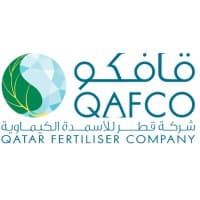
Head of Economic Evaluation

Qafco (Qatar Fertiliser Company)
The world’s largest single-site exporter of urea, producing ammonia and urea with 6 advanced plants.
Lead economic and financial assessment of capital projects and investments.
1 months ago ago
Expert & Leadership (13+ years)
Full Time
Doha, Doha, Qatar
Office Full-Time
Company Size
1,506 Employees
Service Specialisms
Technical Services
Agricultural Analytical Support
Sector Specialisms
Industrial
Energy
Fertilizers
Role
Description
economic modelling
business cases
capital budgeting
risk management
market monitoring
stakeholder collaboration
- Support the capital project governance committees to ensure robust and consistent evaluations for decision-making across all decision gates.
- Verify the attainment of project benefits during the post-implementation audit process. Identify and record lessons learnt for future analysis.
- Involved in the development program for Nationals and other team members, and responsible for people management.
- Collaborate with external stakeholders (i.e., QatarEnergy, consultants, etc.) to ensure alignment with corporate and market objectives.
- Ensure that economic and financial evaluations consider both direct financial impacts and broader operational implications, such as resource allocation and long-term sustainability.
- Act as a key advisor to Management, providing economic insights and ensuring all applicable proposed plant improvements, major capital projects, and investment portfolio decisions align with the company's short- and long-term strategies, market conditions, and sustainability goals.
- Review and provide necessary recommendations for improvements on the departmental policies to ensure smooth operations and establish a positive image of the company internally and externally.
- Prepare and support management-level documentation and presentations for capital expenditure approvals, ensuring alignment with the requirements of the capital project committees.
- Contribute to the identification of opportunities for continuous improvement of processes and practices considering international and local best practices, improvement of business processes, cost reduction, KPIs, and productivity improvement.
- Develop detailed economic and financial models to support business cases, incorporating relevant assumptions on revenue, operating costs, capital expenditure, taxation, and financing structures.
- Play a supporting role in the annual capital budgeting cycle, providing economic insights and prioritization of proposed projects, ensuring optimal use of capital resources in collaboration with Finance Department.
- Monitor market trends, regulatory developments, and competitive dynamics in the global ammonia, urea and melamine industry to support strategic investment decisions.
- Identify and quantify financial risks, providing recommendations for risk mitigation and contingency planning.
- Collaborate with cross-functional teams - including Production, Maintenance, Engineering, Projects, Technical, Finance, and Business Development - to ensure thorough benefit estimation and economic considerations are integrated at every stage of project development and execution.
- Develop and maintain robust methodologies, models, tools for economic and financial analysis, including cost-benefit analysis, sensitivity analysis, and scenario planning tailored to the fertiliser sector.
- Lead the comprehensive preparation and review of significant business cases, encompassing expert guidance, oversight, and in-depth economic and financial analysis for new projects, strategic initiatives, capacity expansions, technology upgrades, and operational efficiency projects, to ensure robust, data-driven decision-making. This includes, but is not limited to, the calculation of financial metrics such as Discounted Cash Flow (DCF), Net Present Value (NPV), Internal Rate of Return (IRR), Discounted Payback Period (DPP), Value Investment Ratio (VIR), and Return on Investment (ROI).
Requirements
10-12 yrs
oil & gas
analytical tools
financial modelling
bachelor’s degree
fertiliser
- 10-12 years of experience in a similar role preferably within the fertiliser, petrochemical or oil & gas industry.
- Proficient in using advanced analytical tools and financial modelling software.
- Bachelor’s Degree in Finance, Economics, Engineering or relevant discipline.
Benefits
Information not given or found
Training + Development
Information not given or found
Interview process
Information not given or found
Visa Sponsorship
Information not given or found
Security clearance
Information not given or found
People also searched
Company
Overview
- Founded in 1969 as Qatar’s first large-scale petrochemical venture, now fully owned by Industries Qatar.
- Operates 6 world-class plants with annual capacities of 3.8 million MT ammonia and 5.6 million MT urea.
- Holds 14% of the global urea supply, aiming to be the largest urea producer by 2030.
- Products include ammonia, urea, melamine, and formaldehyde condensates, with urea primarily used as fertilizer.
- Collaborates in sustainable agriculture projects like hydroponics in the Qatari climate.
- Serves 35+ countries as a global exporter, enabled by Qatar’s vast natural gas resources.
Culture + Values
- Commitment to safety in all aspects of life and operations.
- Fostering teamwork by empowering employees and achieving shared goals.
- Continuous improvement to drive operational and product excellence.
- Adherence to transparency, honesty, and fairness in all actions.
Environment + Sustainability
- Committed to sustainable operations, balancing environmental and economic goals.
- Focused on energy efficiency and emissions reduction in production processes.
- Advancing a circular economy approach in operations and product lifecycle.
- Hydroponic agriculture trials to improve sustainability in Qatar's climate.
- Net-zero emissions target by 2030, positioning itself as a green industry leader.
Inclusion & Diversity
- Commitment to fostering a positive and inclusive work environment.
- Comprehensive recognition programs to celebrate employee achievements.
- Focus on Qatarization by addressing skill gaps and promoting local talent.
- Competency models developed for 60 job families to align skills with organizational needs.
- Established high-potential employee cohorts and a mentorship program.
- Programs to align workforce skills with evolving industry demands.
- Recognition of employee excellence through monthly awards.
Loading...